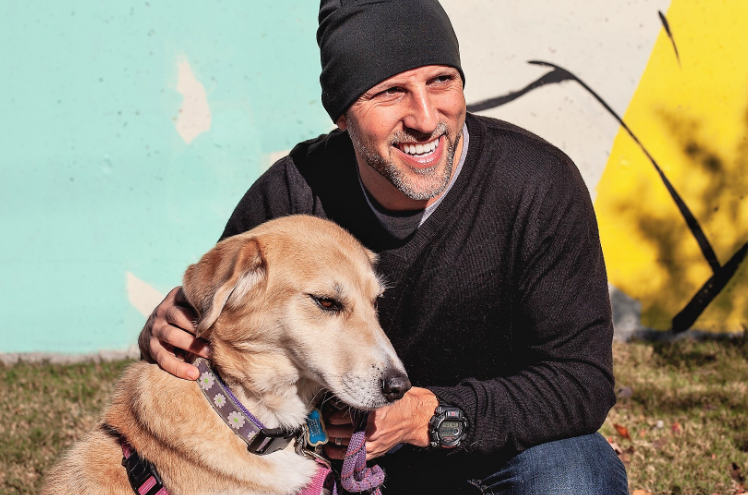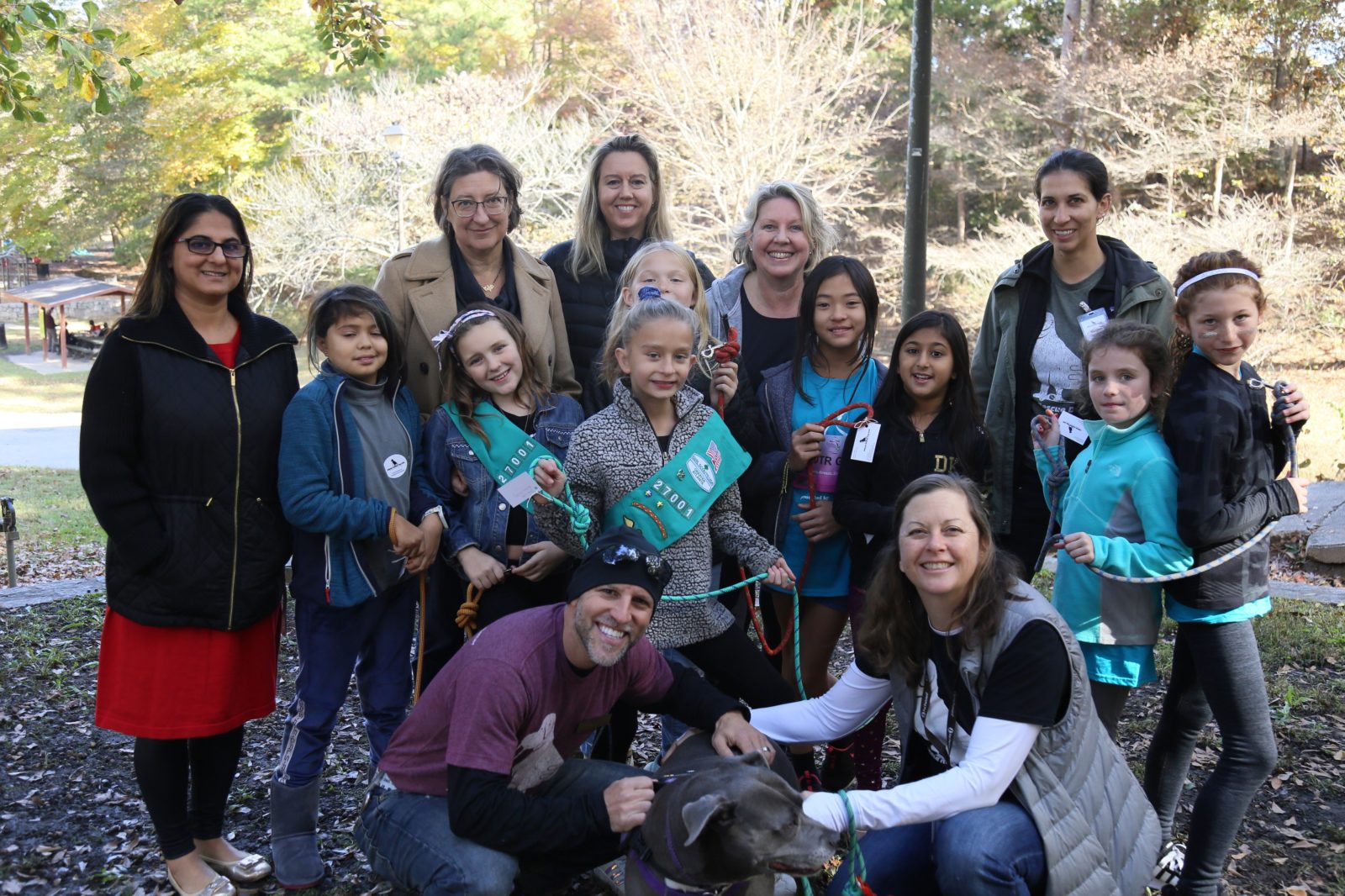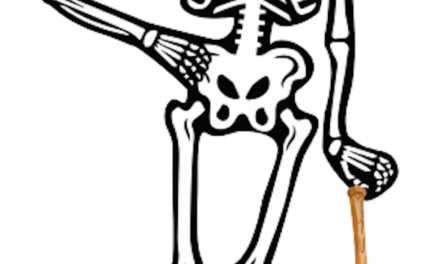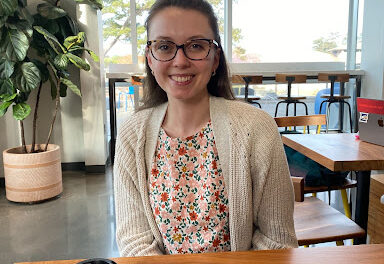Under a sunny sky in Candler Park, girl scouts laugh around a picnic table, fashioning dog leashes from used climbing rope. At the head of the table, CEO and founder of Atlanta Rescue Dog Cafe (ARDC) Aaron Fisher (97C) measures the rope against his arm and demonstrates the proper knotting techniques. These leashes are part of 3,000 pounds of climbing rope from landfills as part of ARDC’s One Leash Project led by Fisher.
The dog cafe is not a physical cafe, but rather an Atlanta-based nonprofit organization that aims to prevent animals from entering already overcrowded shelters. To achieve this, ARDC delivers robust educational programs centered around proper animal care for all those interested.
“We partner with nationally certified teams of therapy dogs, and we go into schools, homeless shelters, scout troops … and senior homes,” Fisher explained. “We teach our participants how to be safe and kind to pets, how to safely approach dogs and what measures we can take to prevent pets from entering shelters.”

Aaron Fisher (97C), CEO and founder of Atlanta Rescue Dog Cafe./ Courtesy of Aaron Fisher
Now in its second year of operation, ARDC has taught over 12,000 kids throughout the greater Atlanta area — 40 percent of whom are from underrepresented communities — about how to safely approach, pet and care for dogs.
Fisher personally leads every ARDC program and said his background in teaching and elementary school education has primed him to instruct proper animal care to people of varying ages.
After a seven-year career as a foreign service officer in the State Department based in Washington, D.C., Fisher moved to Tucson, Ariz. While his wife pursued her doctoral degree, he taught fourth and fifth graders at two Tucson charter schools — the Academy of Math and Science and Tucson Country Day School — everything from reading and language arts to science and math.
Fisher’s passion for teaching stemmed from his undergraduate experience at Emory University, as a member of Volunteer Emory. He regularly tutored kids at an after-school homeless shelter, the First Iconium Baptist Church (now called Nicholas House).
Due to these experiences, Fisher was confident that teaching was in his future.
“I told myself that if I was at a desk twiddling my thumbs, I would get back in education,” Fisher explained.
Even as a full-time teacher in Arizona, Fisher volunteered at animal shelters and animal rescue groups that take in abandoned or unwanted animals. When the Humane Society of Southern Arizona (HSSA) offered him the paid manager of volunteer services position in early 2015, he jumped at the opening.
“It was a carte blanche to create any new programs that I wanted and a unique opportunity for me to get involved,” Fisher said. “I loved it.”
But one worry followed Fisher throughout his work with the HSSA. Although Fisher supports shelters for their fostering and life-saving initiatives, after 12 years of volunteering at animal shelters, Fisher had noticed a concerning pattern.
“I realized that the number of animals entering shelters keeps going up,” Fisher said. “The incentive on the part of shelters is always to show they have the capacity to take in more animals, rather than doing what they can to prevent animals from having to go to shelters in the first place.”

The Atlanta Rescue Dog Cafe hosted an event on Nov. 17 at Candler Park where a Girl Scout troop re-purposed climbing rope into dog leashes./ Courtesy of Alisa Yan (21B)
According to Fisher, a major reason animals wind up in shelters stems from misunderstandings of how to properly approach dogs. He recognized that people should always ask owners before petting or approaching their dogs in order to prevent the dogs from reacting violently.
“That gives an owner the chance to say, ‘Sorry, my dog’s in training or isn’t friendly with people,’” Fisher said. “That way, you’re less likely to get bitten, and the dog is less likely to wind up as a bite case and be quarantined in a shelter.”
Fisher also noted that lost pets lacking identification frequently wind up in shelters. ARDC therefore emphasizes the importance that all pets be microchipped and have a collar with identification so the pet can be returned safely to the owner.
With these observations in mind and ready to change the conversation surrounding animal rescue, Fisher and his wife moved back to Atlanta in 2016, and ARDC went into action.
In Atlanta, ARDC engages in tireless community outreach, which is evident from the several dog walkers at Candler Park who call out to Fisher with a wave, grasping Fisher’s homemade leashes. From booths at farmers markets to programs with kids, ARDC has become a known entity throughout the Atlanta area, apparent from the increasing number of requests for his programs over the last two years, according to Fisher.
“Initially, we had to drum up interest and show that there’s a demand for what we’re offering,” Fisher noted. “Now, people have heard about us through word of mouth and invite us to their programs. In addition to reaching out to people, we get reached out to.”
It’s also through word of mouth that Fisher has gotten volunteers involved like Lisa Myers, who has been a volunteer for two years. After striking up a conversation while shopping at Ace Hardware, their happenstance meeting led Myers to bring her certified therapy dog, Pig, to various ARDC programs.
“[Fisher] caught me up with his program,” Myers said. “I was hooked. Within two weeks, I was [bringing Pig to] my first Girl Scout troop [to teach kids how to safely approach and pet dogs].”
Fisher’s elevator pitch also worked on Alisa Yan (21B), who met Fisher at an Emory career fair in Spring 2019. Yan now interns at ARDC, taking photos of events, sharing information about their projects to those interested in getting involved and spreading awareness of the nonprofit.
Fisher recognized that the ARDC’s educational endeavors are different from other shelters and rescue centers across the nation.
“We don’t take in. We don’t adopt out,” Fisher said. “We want to prevent animals from coming to shelters in the first place. We’re the only organization that’s doing this.”
Fisher has big plans for the future of ARDC. Within the next year, he hopes to raise money to establish a physical cafe, continuing the conversation about human-animal interactions.
“You could get your drinks and watch our humane education programs taking place, knowing that your espresso drink is directly supporting these initiatives that help teach kindness and empathy towards animals,” Fisher said.
With these changes on the horizon, Fisher said that Emory students can do more than donate to support ARDC. He believes that change results from questioning the status quo and creating your own answer.
“You have to suspend ego,” Fisher said. “Do you want to be a flash in the pan and have a short-term impact, or do you want to make an impact in the long term? It’s important to ask questions and be willing to roll up your sleeves and put yourself out there.”
Correction (12/7/19 at 8:50 a.m.): A previous version of this article incorrectly stated that leashes are part of over 300,000 pounds of repurposed rope, kept out of landfills, and that Fisher moved to Tucson, Ariz., while his wife pursued her master’s degree. In Fact, leashes are part of 3,000 pounds of climbing rope material from landfills, and his wife was pursuing her doctoral degree.
Zoë Friedman (22C) is from Rockville, Maryland, and intends to major in business. Aside from running XC/Track for Emory, she is also the Director of Outreach for the Goizueta Marketing Club. In her free time, she enjoys making magazines, devising healthy gluten-free recipes, and operating her various entrepreneurial start-ups.





